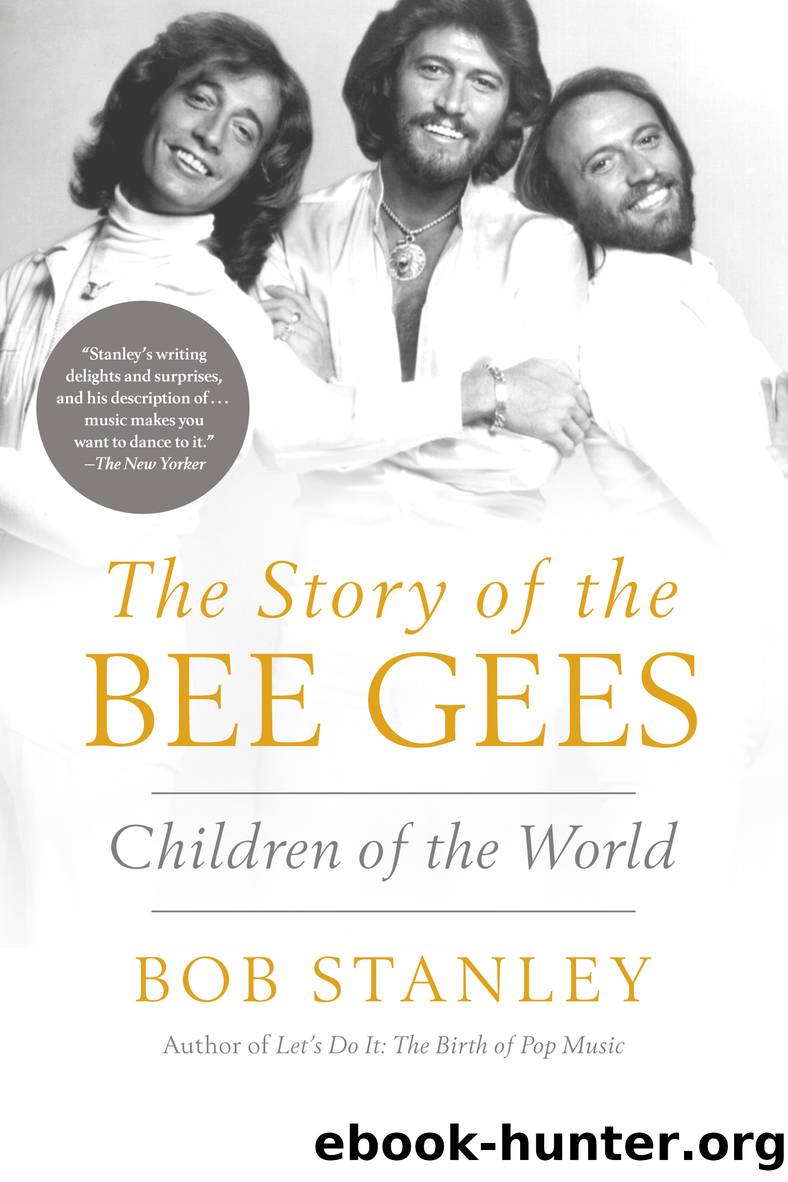Children of the World by Bob Stanley

Author:Bob Stanley
Language: eng
Format: epub
Publisher: Pegasus Books
Published: 2024-02-06T00:00:00+00:00
* * *
Falsetto singing in pop had always meant heightened excitement. In the Gibbsâ childhood there had been Del Shannonâs âRunawayâ, an international number one in 1961, built around the twin hooks of Shannonâs otherworldly âWah-wah-wah-wah-wonderâ and the space-age, proto-synth Musitron solo played by Max Crook. Jan and Deanâs âSurf Cityâ, written by Beach Boy Brian Wilson, screamed âtwo girls for every boyâ to horny teenagers in 1963, and that promise helped it to number one in America and Australia. Also in 1963, Frankie Valli and the Four Seasons scored a third US number one with the extraordinary âWalk Like a Manâ, with a lyric that would seep into Barry Gibbâs subconscious. Valliâs voice was so otherworldly that from 1964 onwards the Four Seasonsâ record labels, on hits like âRag Dollâ and âLetâs Hang Onâ, were credited to the Four Seasons featuring the âsoundâ of Frankie Valli. Not the voice, the sound. And those quote marks arenât mine â theyâre on the label. Valliâs fire siren falsetto sounded almost inhuman. These were not songs you would try to sing in the shower. But if one record bottled the essence of falsetto power, it was âLightning Strikesâ by Pittsburgh singer Lou Christie, a US number one in 1966, the year the Bee Gees had cut âSpicks and Specksâ â the anticipation, the release, the sheer simple joy of pop noise is defined by Christie on that chorus.
âIâve never had reservations about using it,â said Barry in 1998. âWhen I look back, itâs something I ought to be proud of. Brian Wilson, Frankie Valli and even Prince â they donât make any bones about doing that. The first rock ânâ roll record I ever heard was âLittle Darlinâââ by the Diamonds, and that was falsetto. I think falsetto has been an integral part of rock ânâ roll. I think itâs nice to be one of those falsetto voices thatâs quite well known.â
It wasnât just the range of his voice that now surprised Barry. His new-found power really shook him. When he had gone for power before he had always switched to his âsoulâ voice, a chest voice rather than a head voice, and one clearly borrowed from his heroes, with the twitches and signifiers, the âgot-ta got-taâ vision of soul exemplified by Otis Redding in the mid-â60s. Barry would employ this style on his most leonine songs; Ideaâs âWhen the Swallows Flyâ, or Mr Naturalâs âGive a Hand, Take a Handâ. It signified old-school, alpha-male masculinity.
But now he discovered he had a way more powerful voice, right up there, that signified something much more ambiguous. Though he would continue to write lyrics that suited his old soul voice, he would now be singing lines like âYou can tell by the way I use my walk Iâm a womanâs man, no time to talkâ in falsetto. His voice sounded fluid, more effortless, and he seemed capable of holding notes longer (try singing the long, descending, final syllable on the chorus of âStayinâ Aliveâ: it is nigh on impossible).
Download
This site does not store any files on its server. We only index and link to content provided by other sites. Please contact the content providers to delete copyright contents if any and email us, we'll remove relevant links or contents immediately.
| Biographies | Business |
| History & Criticism | Instruments |
| Musical Genres | Recording & Sound |
| Reference | Songbooks |
| Theory, Composition & Performance |
The Goal (Off-Campus #4) by Elle Kennedy(12450)
Kathy Andrews Collection by Kathy Andrews(10554)
Diary of a Player by Brad Paisley(6872)
What Does This Button Do? by Bruce Dickinson(5536)
Assassin’s Fate by Robin Hobb(5254)
Big Little Lies by Liane Moriarty(4892)
Pale Blue Dot by Carl Sagan(4018)
Sticky Fingers by Joe Hagan(3458)
The Heroin Diaries by Nikki Sixx(2941)
The Death of the Heart by Elizabeth Bowen(2910)
Beneath These Shadows by Meghan March(2729)
The Help by Kathryn Stockett(2707)
Confessions of a Video Vixen by Karrine Steffans(2681)
How Music Works by David Byrne(2536)
Jam by Jam (epub)(2496)
Harry Potter 4 - Harry Potter and The Goblet of Fire by J.K.Rowling(2421)
Strange Fascination: David Bowie: The Definitive Story by David Buckley(2370)
Petty: The Biography by Warren Zanes(2240)
Darker Than the Deepest Sea by Trevor Dann(2213)
